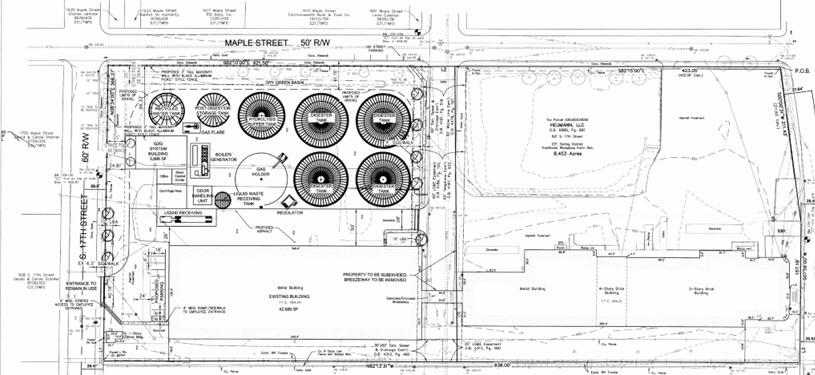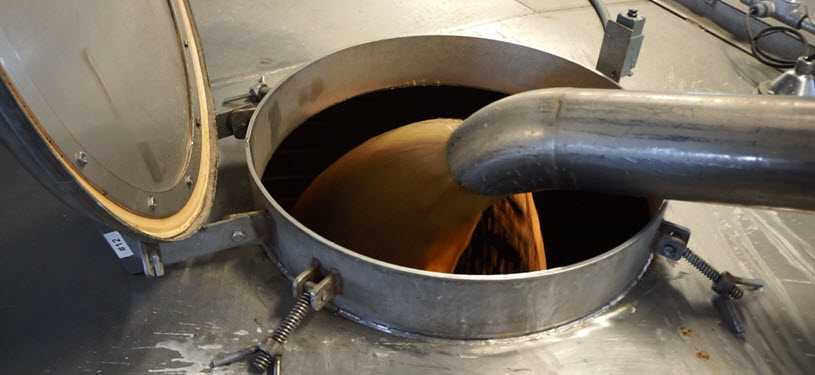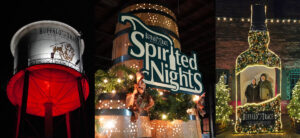
The Louisville Kentucky Metro Board of Zoning Adjustment (BOZA) meeting scheduled to start at 6:00pm on December 7, 2015 to decide the fate of the Heaven Hill Bio Digester plant turned into a marathon going until just after 2am the next day. In the end, a decision was made by the board to delay a vote until there was further information gathered and shared.
The zoning board had scheduled about an hour to hear from people that wanted to speak for and against the plant. With more than 30 people signed up to speak both for and against the plant, it was clear one hour for testimonies, presentations and public comment would not be enough time.
Stay Informed: Sign up here for our Distillery Trail free email newsletter and be the first to get all the latest news, trends, job listings and events in your inbox.
The project, proposed by Heaven Hill and their partner STAR BioEnergy is to build a $35 million plant that will take the stillage (spent grains) from the distillery and turn it into renewable, green energy. The energy produced would be natural gas that would be sold to the local utility company and pumped back into the local gas grid. The solids would be used for compost or fertilizer. Additional water from the plant would be sent into the local sewer system. Today, a portion of the spent grain and water mixture is picked up by 30 to 40 trucks per day and taken to local farms to be fed to livestock. The remaining mixture is sent into the sewer system for treatment by the local sewer utility.
Mixture of Grains and Water Used During the Distilling Process

The proposed plant would pump the stillage underground from the distillery to the anerobic biodigester plant to be converted to renewable energy. The gas would be sold to the local gas utility. Residents are concerned about having a methane plant in their backyard. They are worried about the safety of the neighborhood and smells that the plant may give off. Residents raised concerns about the black fungus already on their homes and cars that comes from the aging distilled spirits and worry that this new plant may create new problems.
“We are asking you to make a zoning decision based on facts, not on unfounded fears,” Danny Potter, master distiller at Heaven Hill, told the zoning board.
85% of Waste for Conversion to Come from Local Community
Included in the latest proposal, Heaven Hill would provide approximately 75% of the waste for the plant while another 15% would come from the local community and the remaining 15% would come from outside the area. The proposal includes a promise to allow a maximum of 10 trucks per day for that additional 15%. All of those trucks would be covered so as not to scatter waste around the neighborhood. The company said those trucks would be unloaded inside the facility to minimize any waste and odors outside of the facility.
City’s Mayor Supports the Project
The city’s Mayor Greg Fischer has come out in favor of the plan and has worked diligently to get community leaders and plant officials to work together to come up with a plan that all participants could agree upon. A huge part of the agreement is a $5 million gift to the community from STAR BioEnergy and Heaven Hill that will be provided to the community over the next 10 years. You can read more about that commitment here.
You can see a full size graphic of STAR BioEnergy Project Site plan here.
The follow up Board of Zoning Adjustment (BOZA) meeting is scheduled for January 21, 2016.
You can learn more about the bio energy making project from these related stories.
Heaven Hill $40 Million Plan to Convert Spent Grain into Biogas Runs into Opposition
School Board Endorses Biogas Digester at Heaven Hill Distillery
Heaven Hill vs. Toyota: 2 Stories of Renewable Energy – 1 is BullSh*t
What is an Anaerobic Digester & How Does It Create Renewable Energy?
Heaven Hills Bio Digester Partner to Gift Community $5 Million
Group Once Opposed to Heaven Hill Bio Digester Plant, Now in Favor
You can learn more about the GE anaerobic digestion technology by visiting their website.




